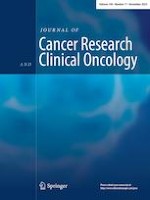Erschienen in:

05.09.2023 | Research
Correlation between androgen and estrogen receptor expression and clinicopathologic features in carcinoma urinary bladder
verfasst von:
Nikita Shrivastava, Rahul Jena, Gautam Ram Choudhary, Priyank Bhargava, Vikarn Vishwajeet, Poonam Elhence, Mahendra Singh, Deepak Prakash Bhirud, Arjun Singh Sandhu
Erschienen in:
Journal of Cancer Research and Clinical Oncology
|
Ausgabe 17/2023
Einloggen, um Zugang zu erhalten
Abstract
Introduction
The molecular mapping of cancers by the Cancer Genome Atlas Project has accelerated the quest for new therapeutic targets for urinary bladder cancer, including sex steroid receptors. Previous studies have demonstrated conflicting results on their relationship with bladder cancer, and there is sparse data on their expression in the Indian population. The aim of our study is to examine the expression of androgen receptors (AR) and estrogen receptors (ERα and ERβ) in patients with bladder cancer and their correlation with clinicopathologic features.
Materials and methods
In this retrospective cohort study, a total of 132 patients, who were surgically managed for urinary bladder mass by transurethral resection or radical cystectomy in our institute, with transitional cell carcinoma on histopathology and with at least two years of follow-up were included. Their demographic and treatment details were obtained, histopathology blocks were retrieved and immunohistochemical staining for androgen and estrogen receptors was performed. Then, the relationship between their expression and clinicopathologic features was studied.
Results
A total of 3.79% of patients showed estrogen receptor alpha positivity, 51.52% estrogen receptor beta positivity and 63.64% androgen receptor positivity. No statistically significant correlation was found between age of patients (p = 0.75/0.52/0.87), tumour stage and grade (0.71/0.3/0.21), pathological variant (p = 1/0.58/0.38) and overall survival (p = 0.70/0.052/0.45 for NMIBC and p = 0.82/0.36/0.22) and estrogen receptor alpha, estrogen receptor beta and androgen receptor-positive status, respectively. Estrogen receptor beta positivity was significantly higher in patients with unifocal (p = 0.015) and small tumours (< 5 cm) (p = 0.03), and its expression was associated with better disease-free survival (DFS) (p = 0.046) in patients of non-muscle invasive bladder cancer (NMIBC).
Conclusion
Our study has the largest sample size conducted on Indian population with results differing from previous studies conducted on western population. Estrogen receptor beta expression was significantly associated with small unifocal tumours and better DFS. Estrogen receptor alpha and androgen receptor expression were not found to be associated with the clinicopathologic features of the study population.











